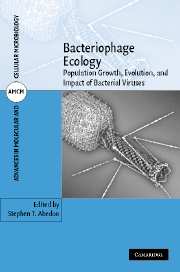1 - Phages, ecology, evolution
Published online by Cambridge University Press: 29 September 2009
Summary
INTRODUCTION
Ecology is the study of the interactions between organisms and their environments. Within our planet's varied environments there exist 1030 or more individual bacteria (Whitman et al., 1998), and perhaps 10 or more times as many bacterial viruses, or bacteriophages (phages) as they are more typically described. Whether these viruses are diffusing, decaying, or finding bacteria to adsorb and infect, what is certain is that phages must participate in enormous numbers of ecological interactions. From these numbers we can limit our considerations to approximately four perspectives: (1) how phages operate in the wild; (2) the impact of phages on bacteria, on bacterial communities, and on ecosystem nutrient flow; (3) the employment of phages as model systems for the study of basic principles of ecology, and (4) the diversity of phages in environments. In this monograph, Bacteriophage Ecology: Population Growth, Evolution, and Impact of Bacterial Viruses, we take on these approaches, emphasizing how an understanding of phages in the laboratory, both theoretically and empirically, can translate into an understanding of how they operate in the wild. In this chapter I introduce the concept of what phages are and provide overviews of phage biology, phage ecology, and phage evolutionary biology.
- Type
- Chapter
- Information
- Bacteriophage EcologyPopulation Growth, Evolution, and Impact of Bacterial Viruses, pp. 1 - 28Publisher: Cambridge University PressPrint publication year: 2008
- 11
- Cited by



